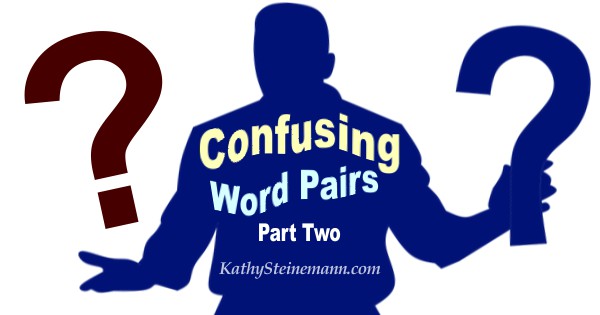
Which Word is Correct?
Passed or past? Poll or pole? Precede or proceed? Stationery or stationary? These, and other words, confuse many writers. Let’s get them straight.
Most of the words in this post are homophones. They sound the same but have different meanings — meanings that can cause laughs or raised eyebrows if you don’t apply them correctly.
Each word pair that follows is accompanied by at least one definition for each word, as well as mnemonic triggers.
Are you ready?
Here Are Today’s Words
passed and past
passed: past tense, past participle of pass: to move or make something move in a specific direction
past: earlier; before the present; referring to or of a time that has gone by
Mnemonic triggers:
- He was embarrassed when he passed the mirror and noticed the gravy on his chin.
- I got a raise at last, at last! My downcast moods are in the past.
peace and piece
peace: tranquility; harmony
piece: a chunk; a portion
Mnemonic triggers:
- Each and every realm has earned its peace.
- I yielded to my niece and gave her a piece of the pie.
pedal and peddle
pedal: to move by operating the pedals of a bicycle, a pedal boat, etc.
peddle: to sell; to hawk
Mnemonic triggers:
- She pedaled around the Dalmatian.
- The meddlesome cop wouldn’t let the hawker peddle on the beach.
plain and plane
plain: simple; unadorned; normal
plane: an aircraft; a level surface
- Let me explain: It’s plain he’s a villain.
- The planet had no landing strips for spaceplanes.
poll and pole
poll: survey; canvass; market research
pole: a rod; a stick; a baton; a shaft
Mnemonic triggers:
- The results of the poll were exceedingly droll.
- The farmer stuck a pole in the hole.
pore and pour
pore: a minute opening in a surface, usually the skin
pour: to flow rapidly; to gush; to rain heavily
Mnemonic triggers:
- His face was disfigured by humongous pores and weeping sores.
- The water poured through our yard.
By the way, you pore through an absorbing story.
pray and prey
pray: to ask; to beseech; to express thanks to or make requests of a deity
prey: quarry; an animal that is hunted by a human or another animal, usually for food
Mnemonic triggers:
- They prayed several times a day.
- Osprey eggs are sometimes prey for raccoons.
The Writer’s Lexicon series
and additional resources on my Facebook page.
precede and proceed
precede: to go before; to pave the way
proceed: to advance; to go on; to keep going
Mnemonic triggers:
- The Swedes preceded the Germans in the parade.
- We will proceed if results exceed expectations.
principal and principle
principal: main; primary; a head teacher; a leader
principle: a fundamental truth; a concept
Mnemonic triggers:
- The principal had clammy palms.
- This principle has triple the impact during war.
roll and role
roll: to revolve; to turn over repeatedly on an axis; a tiny loaf of bread
role: function; position; an actor’s part in a movie, TV series, etc.
Mnemonic triggers:
- She rolled the stroller full of rolls to her college.
- His role was to trap the mole in the hole.
sew and sow
sew: to join, make, or repair something using a needle and thread or a machine designed to do the same
sow: to spread seeds on earth
Mnemonic triggers:
- She sewed the dress while the coffee brewed.
- She sowed the seeds while the cows mooed.
stationery and stationary
stationery: writing materials; pen and paper
stationary: not moving; immobile; motionless
Mnemonic triggers:
- She pulled out her stationery and wrote a note to the bakery.
- They called him the stationary notary because he never left his desk.
waist and waste
waist: the part of the human body between the hips and the ribs
waste: to squander; to expend carelessly
Mnemonic triggers:
- She wrapped a daisy garland around her waist.
- Don’t waste the leftover flour; you can make paste with it.
week and weak
week: seven calendar days
weak: fragile; frail; defenseless
Mnemonic triggers:
- He’s a geek who works seven days a week.
- The bird was too weak to open its beak.
wonder and wander
wonder: to speculate; to deliberate; to ponder
wander: to stroll; to saunter; to roam
Mnemonic triggers:
- I wonder if you ponder as you eat your fondue.
- He wandered with his wand in hand.
Did You Miss the First Part in This Series?
See Easily Confused Words and How to Get Them Right: Part 1.
The Writer’s Lexicon series
and additional resources on my Facebook page.
Discover more from KathySteinemann.com: Free Resources for Writers
Subscribe to get the latest posts sent to your email.

Hi Miss Kathy,
Hooray, I knew all of them.
In school, for principal, we were taught to think, “The princi-pal is our friend.” Hmm, not so sure about that.
For stationery vs stationary, I think of “e” for “essay” and “a” for actionless.
Thanks for another cool post.
Stay safe.
RIP Queen Elizabeth II
Fist bumps.
Excellent mnemonics, Lenny. Thanks!
Good health and happy writing.
Queen Elizabeth was a unique lady. The world won’t be the same without her elegance and sense of humor. She was always part of my life.
Easy peasy 🙂
J
Congrats, James!
I tend to confuse principal and principle, also stationary and stationery. Thanks for your help in sorting it out for me.
Mantel/mantle used to catch me. Oh — and lightening/lightning. Mnemonics to the rescue.
Thanks for stopping by again, Vivienne, and for sharing your thoughts. Happy writing!
The best way to cure this confusion is a course of HRT – Homophone Replacement Therapy.
You got me on that one for a second, Peter. 😉
Have a great day!